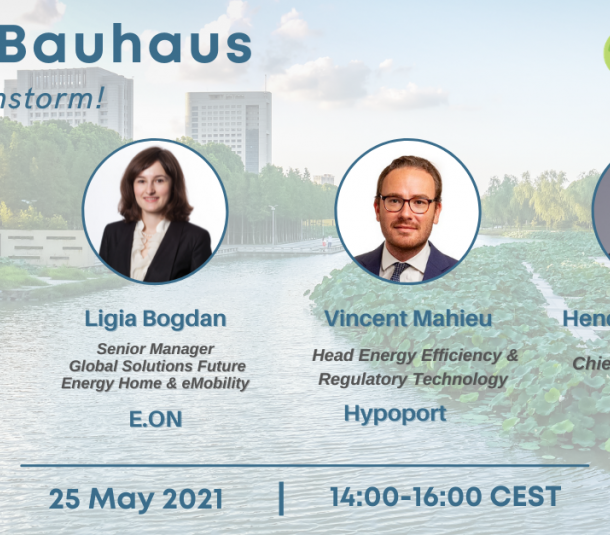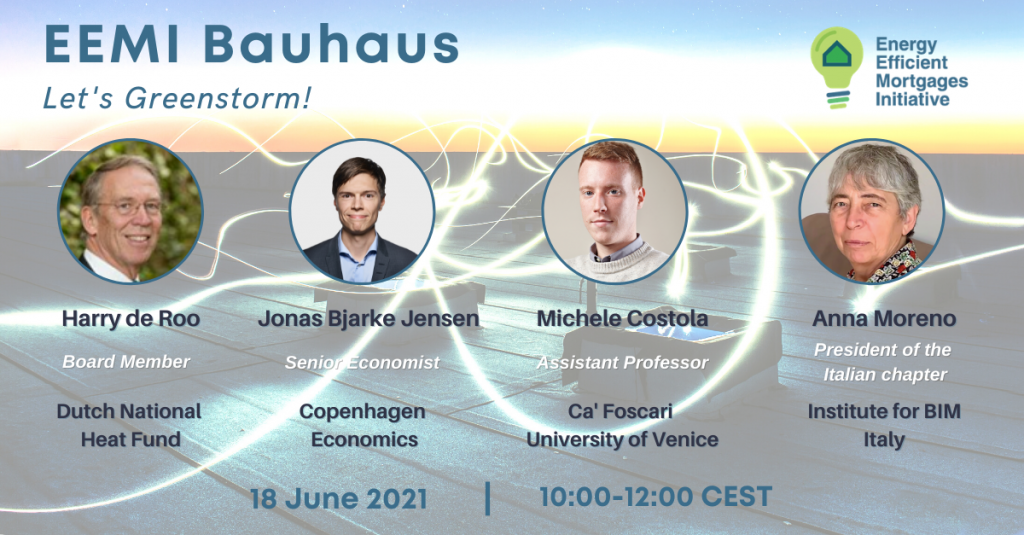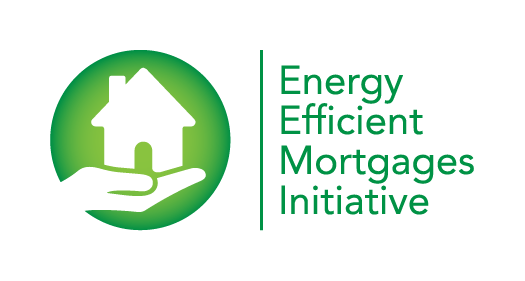
EEMI BAUHAUS LET’S GREENSTORM! | SEVENTH VIRTUAL EVENT

EEMI BAUHAUS LET’S GREENSTORM! | SEVENTH VIRTUAL EVENT
As coordinator of the Energy Efficient Mortgages Initiative (EEMI), the European Mortgage Federation – European Covered Bond Council (EMF-ECBC) is delighted to invite you the 7th Edition of the Virtual EEMI Bauhaus Event this Friday, 18 June from 10:00 to 12:00 CEST.
To access the event, please use this link.
After six months of successful Greenstorming we would like to share with you the new content of the EEMI Bauhaus webpage where you can find all recordings, presentation materials together with the agenda.
Each presentation will be followed by a 15 minutes Question & Answer Session open to all participants
For this 7th edition, we are pleased to present the following exciting agenda:
7TH EEMI BAUHAUS EVENT
FRIDAY, 18 JUNE 2021, 10H00-12H00 (CEST)
AGENDA
- Welcome – Luca BERTALOT, EEMI Coordinator
- Introduction by the Moderator – Richard KEMMISH, Richard Kemmish Consulting
Presentations
Each presentation will be followed by a 15 minutes Question & Answer Session open to all participants
The National Heat Fund in the Netherlands
Harry de Roo, Board member
To increase the speed at which Dutch homeowners are able to make their homes more sustainable, it has been decided to create a standalone foundation (not for profit entity) wherewith public/private funding relatively cheap loans are available (for private homeowners, schools and Homeowner Associations) to finance specifically defined energy-saving measures. The annuity of the loan can be largely paid by the benefits of the energy savings.
SEE PRESENTATION HERE
- 10H30 – COPENHAGEN ECONOMICS
Transition risks for the mortgage portfolio – a blueprint
Jonas Bjarke Jensen, Senior Economist
We will outline a straightforward approach to a climate transition risk scenario analysis for credit risk in the mortgage portfolio. The focus will be on applying developed principles, e.g. by BIS, NGFS and TCFD to provide concrete numbers on the likely impact on credit quality and solvency ratio. The aim is that the approach will be directly applied on an institutional level. We will use a generic mortgage portfolio, based on EU averages, to illustrate the methodology and outline the actual impact on risk-weighted assets, and the solvency ratio. The presentation will end with a discussion on the implication of capital buffers and risk management.
SEE PRESENTATION HERE
- 11H00 – CA’ FOSCARI UNIVERSITY OF VENICE
Buildings’ Energy Efficiency and the Probability of Mortgage Default: The Dutch Case
Michele Costola, Assistant Professor
The paper investigates the relationship between building energy efficiency and the probability of mortgage default. To this end, we construct a novel panel data set by combining Dutch loan-level mortgage information with provisional building energy ratings provided by the Netherlands Enterprise Agency. Using the logit regression and the extended Cox model, we find that building energy efficiency is associated with a lower probability of mortgage default. This suggests that the energy efficiency ratings complement borrowers’ credit information and that a lender using information from both sources can make superior lending decisions than a lender using only traditional credit information. Those aspects are not only crucial for shaping future energy policy, but also have implications for the risk management of European financial institutions.
SEE PRESENTATION HERE
- 11H30 – IBIMI, INSTITUTE FOR BIM ITALY
How Building Information Modelling and right competences can guarantee the return of investment
Anna Moreno, President of the Italian chapter of buildingSmart International
Building Information Modelling is the instrument that can ensure the quality of the design of refurbishment. It can represent the digital model of a real building where all the actors of the refurbishment process can meet to exchange information and take informed decision. But the quality of design is not enough to ensure the foreseen performance of a building. In fact, the competences of the professionals, technicians and workers employed in the refurbishment need to be proved to avoid mistakes during the work that will affect the entire lifetime of the building. Both these aspects are considered crucial to guarantee the return of investment when dealing with energy performance of a building.
SEE PRESENTATION HERE
VIDEO RECORDING
Additional Details
Sitemap
Copyright © Energy Efficient Mortgages Initiative


The project DeliverEEM has received funding from the European Union’s LIFE 2023 programme under grant agreement No.101167431. The EeMAP, EeDaPP, EeMMIP projects have received funding from the European Union’s Horizon 2020 research and innovation programme under grant agreements No. 746205, No. 784979 and No. 894117 respectively
Privacy Overview
| Cookie | Duration | Description |
|---|---|---|
| cookielawinfo-checkbox-analytics | 11 months | This cookie is set by GDPR Cookie Consent plugin. The cookie is used to store the user consent for the cookies in the category "Analytics". |
| cookielawinfo-checkbox-functional | 11 months | The cookie is set by GDPR cookie consent to record the user consent for the cookies in the category "Functional". |
| cookielawinfo-checkbox-necessary | 11 months | This cookie is set by GDPR Cookie Consent plugin. The cookies is used to store the user consent for the cookies in the category "Necessary". |
| cookielawinfo-checkbox-others | 11 months | This cookie is set by GDPR Cookie Consent plugin. The cookie is used to store the user consent for the cookies in the category "Other. |
| cookielawinfo-checkbox-performance | 11 months | This cookie is set by GDPR Cookie Consent plugin. The cookie is used to store the user consent for the cookies in the category "Performance". |
| viewed_cookie_policy | 11 months | The cookie is set by the GDPR Cookie Consent plugin and is used to store whether or not user has consented to the use of cookies. It does not store any personal data. |

